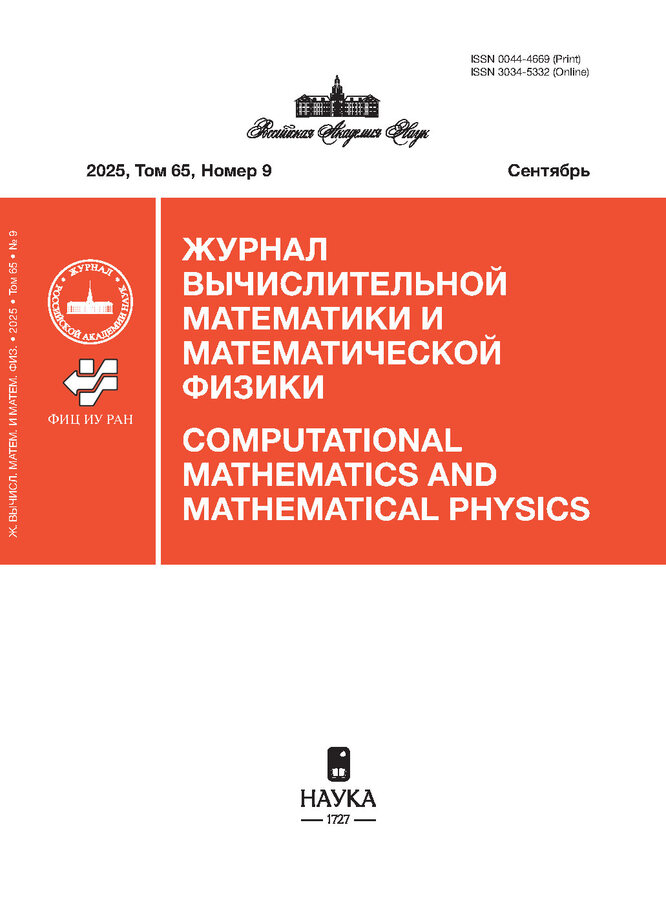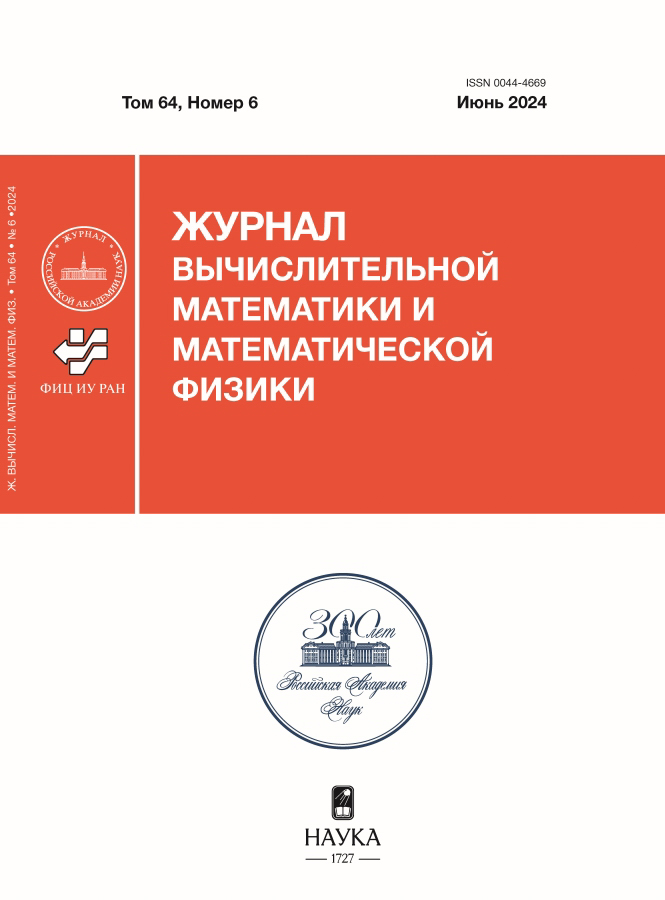FAULT-TOLERANT FAMILIES OF PRODUCTION PLANS: MATHEMATICAL MODEL, COMPUTATIONAL COMPLEXITY AND BRANCH AND BOUND ALGORITHMS
- Authors: Ogorodnikov Y.Y.1, Rudakov R.A.1, Khachay D.M.2, Khachay M.Y.1
-
Affiliations:
- Krasovskii Institute of Mathematics and Mechanics, Ural Branch, Russian Academy of Sciences
- KEDGE Business School
- Issue: Vol 64, No 6 (2024)
- Pages: 940-958
- Section: Optimal control
- URL: https://rjonco.com/0044-4669/article/view/665061
- DOI: https://doi.org/10.31857/S0044466924060058
- EDN: https://elibrary.ru/XYUTPT
- ID: 665061
Cite item
Abstract
About the authors
Yu. Yu. Ogorodnikov
Krasovskii Institute of Mathematics and Mechanics, Ural Branch, Russian Academy of Sciences
Email: yogorodnikov@imm.uran.ru
Yekaterinburg, 620108 Russia
R. A. Rudakov
Krasovskii Institute of Mathematics and Mechanics, Ural Branch, Russian Academy of Sciences
Email: r.a.rudakov@gmail.com
Yekaterinburg, 620108 Russia
D’ M. Khachay
KEDGE Business School
Email: daniil.khachai@kedgebs.com
Talence, France
M. Yu. Khachay
Krasovskii Institute of Mathematics and Mechanics, Ural Branch, Russian Academy of Sciences
Email: mkhachay@imm.uran.ru
Yekaterinburg, 620108 Russia
References
- Schilling L., Seuring S. Linking the digital and sustainable transformation with supply chain practices // Int. J. Prod. Res. 2023. https://doi.org/10.1080/00207543.2023.2173502
- Fan Y., Schwartz F., Vob S., Woodruff D. L. Catastrophe insurance and flexible planning for supply chain disruption management: a stochastic simulation case study // Int. J. Prod. Res. 2023. https://doi.org/10.1080/00207543.2023.2176179
- Fortune S., Hopcroft J., Wyllie J. The directed subgraph homeomorphism problem // Theor. Comput. Sci. 1980. V. 10. N 2. P. 111–121.
- Eilam-Tzoreff T. The disjoint shortest paths problem // Discret. Appl. Math. 1998. V. 85. N 2. P. 113–138.
- Ferone D., Festa P., Guerriero F., Laganà D. The constrained shortest path tour problem // Comput. Oper. Res. 2016. V. 74. P. 64–77.
- Ferone D., Festa‘P., Guerriero F. An efficient exact approach for the constrained shortest path tour problem // Optim. Methods Softw. 2020. V. 35. N 1. P. 1–20.
- Martin S., Magnouche Y., Juvigny C., Leguay J. Constrained shortest path tour problem: branch-and-price algorithm // Comp. Oper. Res. 2022. V. 144. P. 105819. https://doi.org/10.1016/j.cor.2022.105819
- Saksena J. P., Kumar S. The routing problem with ’k’ specified nodes // Oper. Res. 1966. V. 14. N 5. P. 909–913.
- Kudriavtsev A., Khachay D., Ogorodnikov Y., Ren J., Shao S. C., Zhang D., Khachay M. The shortest simple path problem with a fixed number of must-pass nodes: a problem-specific branch-and-bound algorithm // LNCS. 2021. V. 12931. P. 198–210.
- Andrade R. C. d. New formulations for the elementary shortest-path problem visiting a given set of nodes // Eur. J. Oper. Res. 2016. V. 254. N 3. P. 755–768.
- Gutin G., Punnen A. P. The Traveling Salesman Problem and Its Variations. B.: Springer. 2007.
- Papadimitriou C. Euclidean TSP is NP-complete // Theor. Comput. Sci. 1977. V. 4. P. 237–244.
- Khachay M., Ukolov S., Petunin A. Problem-Specific Branch-and-Bound Algorithms for the Precedence Constrained Generalized Traveling Salesman Problem // LNCS. 2021. V. 13078. P. 136–148.
- Chentsov A. G., Khachai M. Y., Khachai D. M. An exact algorithm with linear complexity for a problem of visiting megalopolises // Proc. Steklov Inst. Math. 2016. V. 295. N 1. P. 38–46.
- Khachai M. Y., Neznakhina E. D. Approximation schemes for the Generalized Traveling Salesman Problem // Proc. Steklov Inst. Math. 2017. V. 299. Suppl. 1. P. 97–105.
- Khachay M., Neznakhina K. Complexity and approximability of the Euclidean Generalized Traveling Salesman Problem in grid clusters // Ann. Math. Artif. Intell. 2020. V. 88. N 1. P. 53–69.
- Khachay M., Kudriavtsev A., Petunin A. PCGLNS: A heuristic solver for the Precedence Constrained Generalized Traveling Salesman Problem // LNCS. 2020. V. 12422. P. 196–208.
- Morin T. L., Marsten R. E. Branch-and-bound strategies for dynamic programming // Oper. Res. 1976. V. 24. N 4. P. 611–627.
- Khachai D., Sadykov R., Battaia O., Khachay M. Precedence Constrained Generalized Traveling Salesman Problem: Polyhedral study, formulations, and branch-and-cut algorithm // Eur. J. Oper. Res. 2023. V. 309. N 2. P. 488–505.
- Salman R., Ekstedt F., Damaschke P. Branch-and-bound for the Precedence Constrained Generalized Traveling Salesman Problem // Oper. Res. Lett. 2020. V. 48. N 2. P. 163–166.
- Gurobi Optimization. Gurobi optimizer reference manual (2021), https://www.gurobi.com/ documentation/9.5/refman/index.html
- Ropke S., Pisinger D. An adaptive large neighborhood search heuristic for the pickup and delivery problem with time windows // Transp. Sci. 2006. V. 40. P. 455–472.
- Kalateh Ahani I., Salari M., Hosseini S. M., Iori M. Solution of minimum spanning forest problems with reliability constraints // Comput. Ind. Eng. 2020. Vol. 142. P. 106365. https://doi.org/10.1016/j.cie.2020.106365
- Smith S. L., Imeson F. GLNS: An effective large neighborhood search heuristic for the Generalized Traveling Salesman Problem // Comp. Oper. Res. 2017. V. 87. P. 1–19.
- Gendreau M., Potvin J.-Y. Handbook of Metaheuristics. Cham: Springer. 2019.
Supplementary files











